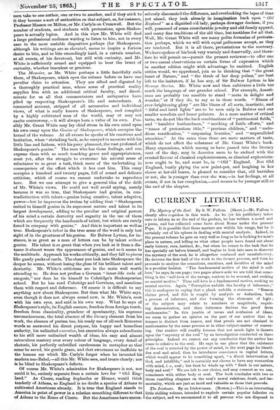CURRENT LITERATURE.
The 3fystery of the Soul. By S. W. Fullom. (Skeet.)—Mr. Fullom is clearly ultra c.repidam in this work. As he (or his publisher) takes care to inform us at the end of the preface, he has written a novel and a poem, and has collected some facts about Rome under the present Pope. It is possible that these matters are within his range, but he is certainly out of his sphere in dealing with mental analysis. Indeed, in the present volume he gets on very well as long as he is looking for man's place in nature, and telling us what other people have found out about early history, race, instinct, ezc., but when ho comes to the task that he has specially set before himself, and begins to look into man to discover the mystery of the soul, he is altogether confused and unsatisfactory. He devotes the first half of the work to the former process, and then -ho proceeds to analyze the sensations, emotions, and faculties of the mind in a peculiar fashion. "The fundamental motive of the mind is self- love," he says, in one page ; two pages afterwards we are told that some- thing is the "self-love of the savage, content to be sensual, and seeking no mental motive." Thus self-love is a fundamental motive, seeking no mental motive. Again, "Perception unfolds the faculty of inference ;" this is analogous to saying that a plank unfolds a staircase. "Reason claims proof, and this is sought by analysis or deduction, both a process of inference, and also forming the elements of logic ; or the subject may relate to numbers or magnitude, requir- ing demonstration, and then inference derives the proof from mathematics." In this jumble of terms and confusion of ideas, we seem to gather an opinion on the part of our author that in- ference is distinct from reason, and that proofs are not obtained in mathematics by the same process as in other subject-matter of reason- ing. Our readers will readily foresee that not much light is thrown upon the "mystery of the soul" by an investigation conducted on these principles. Indeed we cannot see any conclusion that the author has come to relative to the seal. He says in one place that the existence of the soul is attested by the power of mind, in the next page he identi- fies soul and mind, then ho introduces conscience in capital letters, which would appear to be something apart, "a direct intervention of God, and infallible," and is certainly not shown to have any connection with mind, 1. e., soul ; but then he winds up with " Such is our nature, body and soul." We are left to our choice, and may connect as we can, conscience with either body or soul. The book concludes with two or three rambling chapters on the soul's moral relations, death, and im- mortality, which are just as lucid and valuable as those that precede.






























 Previous page
Previous page